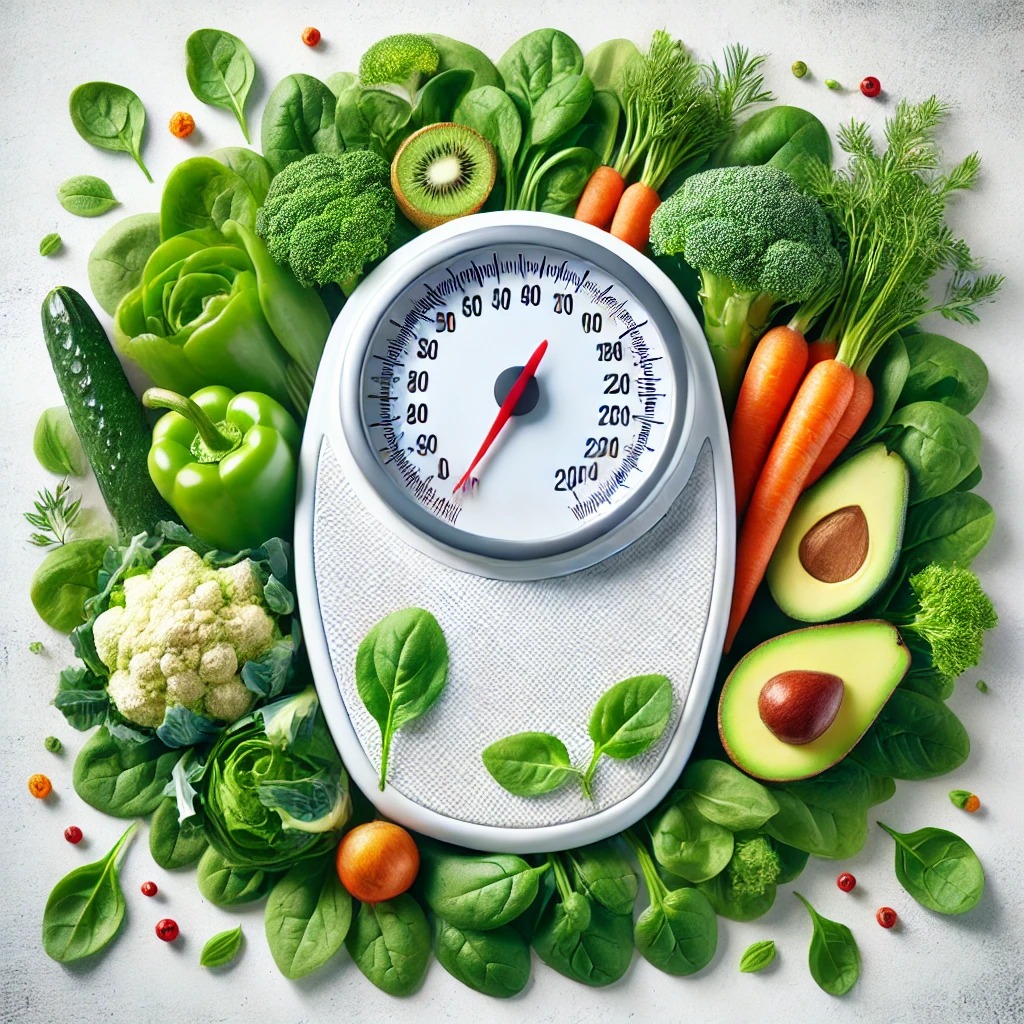Table of Contents

Introduction to Plant-Based Diets
Plant-based diets have garnered considerable attention in recent years, owing largely to their potential health benefits, including weight loss. At their core, plant-based diets emphasize the consumption of foods primarily derived from plants. These diets typically include a wide array of vegetables, whole grains, nuts, seeds, legumes, and fruits. By focusing on such nutrient-rich and naturally low-calorie foods, individuals can achieve a well-balanced and healthful diet.
The term “plant-based diet” can encompass various eating patterns. Among the most prominent are vegan diets, which exclude all animal products; vegetarian diets, which may include dairy and eggs but forgo meat and fish; and flexitarian diets, which primarily consist of plant foods but occasionally include animal products. Each of these dietary patterns offers unique benefits and can be tailored to meet individual health goals and preferences.
Transitioning to a plant-based diet typically involves increasing the intake of whole foods that are high in fiber, vitamins, and minerals while reducing the consumption of processed foods and animal products. This dietary shift can lead to an improved nutrient profile and may support weight loss efforts by naturally reducing caloric intake and promoting satiety.
Furthermore, plant-based diets are often linked to a reduced risk of chronic diseases such as heart disease, diabetes, and certain cancers. This is largely attributable to the high levels of antioxidants, phytonutrients, and healthier fats found in plant-derived foods. Given these potential benefits, many individuals are considering plant-based eating plans as a viable strategy for both weight management and overall health improvement.
In the context of weight loss, adopting a plant-based diet can provide a multifaceted approach. By prioritizing plant foods over animal products and processed alternatives, individuals are more likely to consume fewer calories and more nutrients, creating a favorable environment for achieving and maintaining a healthy weight.
Nutritional Benefits of Plant-Based Foods

A pivotal aspect of plant-based diets is their immense nutritional benefits, offering an extensive array of essential nutrients that are vital for overall well-being and weight management. Plant-based foods are rich sources of fiber, vitamins, minerals, and antioxidants, which collectively contribute to various health advantages.
Fiber stands out as one of the most significant components of plant-based diets. It is abundantly found in fruits, vegetables, whole grains, nuts, and seeds. Fiber not only aids in digestive health but also plays a crucial role in weight management by promoting satiety. As it takes longer to digest, fiber helps curb overeating and supports steady weight loss.
Vitamins are another prominent feature of plant-based foods. These include vitamins A, C, E, and K, each offering unique health benefits. Vitamin A, primarily found in carrots and sweet potatoes, supports vision and immune function. Vitamin C, abundant in citrus fruits and bell peppers, acts as a powerful antioxidant and boosts the immune system. Vitamin E, present in nuts and seeds, protects cells from oxidative stress, while vitamin K, found in leafy greens, is essential for blood clotting and bone health.
Minerals in plant-based diets also play a fundamental role in overall health. Foods like beans, lentils, and leafy greens are rich in iron, which is crucial for oxygen transportation in the blood. Calcium, vital for bone health, can be sourced from fortified plant milks and leafy vegetables. Magnesium, found in nuts and whole grains, regulates muscle and nerve function, blood sugar levels, and blood pressure.
Antioxidants, another key benefit of plant-based foods, work to neutralize free radicals in the body, reducing oxidative stress and inflammation. Berries, nuts, and dark leafy greens are abundant in antioxidants such as flavonoids and carotenoids, which have been shown to protect against various chronic diseases and support weight loss by enhancing metabolic efficiency.
Collectively, these nutrients form a robust foundation for a healthy diet, underscoring the premise that a plant-based diet not only supports overall health but also significantly aids in weight management and the process of shedding pounds.
Caloric Density and Weight Loss

The concept of caloric density, or the number of calories per gram of food, plays a crucial role in weight management and loss. Plant-based diets generally bring an advantageous edge due to their inherently lower caloric density compared to many animal products. Foods such as fruits, vegetables, legumes, and whole grains tend to have fewer calories per gram, allowing individuals to consume larger portions for the same or fewer calories. This can be instrumental in the journey of weight loss.
Eating low-calorie-dense foods can help in managing hunger and satiety, enabling people to feel full without the need to consume excess calories. For instance, a large salad made with leafy greens, tomatoes, cucumbers, and a light vinaigrette typically provides fewer calories than a smaller portion of a cheeseburger or a piece of fried chicken. This means individuals can indulge in generous servings of plant-based foods and still maintain a calorie deficit, which is essential for weight loss.
Moreover, plant-based diets abound in fiber-rich foods like beans, lentils, and whole grains, which further contribute to satiety. Fiber adds bulk to the diet and slows digestion, leading to prolonged feelings of fullness and reduced overall calorie intake. Conversely, many animal products and processed foods are dense in calories but low in volume, making it easy to consume them in large quantities without realizing the calorie load, thereby hindering weight loss efforts.
Scientifically, research supports the benefits of low-calorie-dense foods for weight loss. Studies indicate that diets rich in plant-based foods are associated with lower body mass indices (BMIs) and reduced risks of obesity. People adhering to plant-based diets often experience not just weight loss, but a holistic improvement in health markers due to the rich supply of vitamins, minerals, and antioxidants these foods provide.
Thus, by focusing on the caloric density of foods and opting for plant-based choices, individuals can take substantial strides towards achieving and maintaining a healthy weight. This approach not only supports weight loss but also fosters overall well-being.
Role of Fiber in Satiety

Dietary fiber plays an indispensable role in promoting satiety and fullness, particularly within plant-based diets. Rich sources of fiber abound in plant-based eating patterns, making them highly effective for those seeking weight management through natural means. One of the primary mechanisms through which fiber aids weight loss is by slowing the digestive process. This prolongs the time food stays in the stomach and intestines, thereby extending feelings of fullness and reducing the frequency of hunger pangs. Consequently, individuals are less likely to overeat or reach for unhealthy snacks between meals.
Moreover, fiber’s ability to stabilize blood sugar levels further fortifies its role in effective weight management. By slowing the absorption of sugar into the bloodstream, high-fiber foods prevent the rapid spikes and subsequent crashes in blood sugar levels that often lead to heightened hunger and cravings. Stable blood sugar levels are pivotal in maintaining consistent energy levels throughout the day, thereby curbing the tendency to consume excess calories.
In addition to these direct benefits, high-fiber foods typically require more chewing, which naturally slows down the eating process. This allows the brain more time to register satiety signals from the stomach, reducing the likelihood of overeating. Furthermore, the bulk provided by fiber can help in stretching the stomach, sending signals to the brain that indicate fullness, thus diminishing appetite.
A plant-based diet inherently includes an array of fiber-rich foods such as vegetables, fruits, whole grains, legumes, nuts, and seeds. These foods not only offer fiber but also involve an intricate interplay of nutrients that support overall health. Their inclusion in daily meals can lead to a more sustained and effective method of weight loss compared to diets low in fiber. By integrating an abundance of fiber-rich foods, individuals can achieve and maintain a healthy weight more naturally and comfortably.
Impact on Metabolism
A plant-based diet can have a profound impact on an individual’s metabolism, chiefly due to the inherent properties of plant-based foods. These diets, characterized by high fiber content and lower fat levels, have been shown to enhance metabolic rate. The fiber in plant-based foods not only aids in better digestion but also helps in maintaining a steady blood sugar level, which collectively contributes to a more efficient metabolism.
One of the most significant factors is the thermic effect of food (TEF), which represents the amount of energy expenditure above the basal metabolic rate due to the cost of processing food for storage and use. Plant-based foods tend to have a higher thermic effect compared to their meat and fat-laden counterparts. This means the body burns more calories during the digestion and metabolic process of plant-based meals, thereby enhancing the metabolic rate.
A pivotal study published in the “American Journal of Clinical Nutrition” found that individuals who consumed diets rich in plant-based foods had a significantly higher resting metabolic rate compared to those who followed omnivorous diets. Furthermore, the research highlighted that plant-based eaters often exhibit improved insulin sensitivity, which is crucial for metabolic health. Improved insulin sensitivity ensures that the body uses glucose more effectively, preventing excessive storage of fat and thereby aiding in weight management.
Additionally, the decreased levels of saturated fat in plant-based diets are linked with lower cholesterol levels and reduced risk of cardiovascular diseases, which indirectly supports metabolic health. The nutrient-dense profile of plant foods, rich in vitamins, minerals, and antioxidants, also plays an essential role in optimizing bodily functions and enhancing metabolic activities.
Overall, the shift towards a plant-based diet fosters a more robust metabolic rate, making it a favorable approach for individuals seeking weight loss and improved metabolic health. Through various mechanisms such as high dietary fiber, reduced fat intake, and the thermic effect of food, plant-based diets provide a compelling strategy for enhancing metabolism and promoting overall wellness.
Healthy Plant-Based Proteins
One common misconception about plant-based diets is that they lack an adequate amount of protein necessary for overall health and muscle maintenance. Contrary to this belief, numerous plant-based protein sources can thoroughly meet our nutritional needs while contributing positively to weight loss. Exploring these options can offer a wealth of benefits, promoting both satiety and lean muscle development.
Lentils and chickpeas are exemplary members of the legume family, providing not only substantial protein but also a high fiber content. A cup of cooked lentils, for instance, delivers about 18 grams of protein and a similar serving of chickpeas offers approximately 15 grams. These legumes are versatile, fitting seamlessly into soups, stews, salads, and even as a meat substitute in various recipes, thereby helping manage hunger and reduce overall caloric intake.
Tofu, made from soybean curds, is another excellent source of plant-based protein. With around 10 grams of protein per half-cup serving, tofu is both protein-rich and low in calories. Its versatility allows it to absorb the flavors of any dish, making it a practical and nutritious addition to any diet plan focused on weight loss. Additionally, tofu provides essential amino acids, ensuring comprehensive protein intake.
Quinoa, often considered a superfood, is a complete protein containing all nine essential amino acids. Boasting about 8 grams of protein per cup, this whole grain is not only a potent source of energy but also promotes feelings of fullness. Including quinoa in meals can help regulate hunger, making it easier to stick to weight management goals.
Nuts and seeds, such as almonds, chia seeds, and hemp seeds, are also potent sources of plant-based proteins. While nuts and seeds are higher in fats, they predominantly contain healthy fats which aid in keeping you satiated. A quarter-cup of almonds provides around 7 grams of protein and a similar amount of chia seeds delivers approximately 6 grams. These can be perfect as snacks or mixed into smoothies and salads, providing both crunch and nourishment.
Incorporating a variety of these plant-based proteins into your diet not only ensures you meet your protein requirements but also supports weight loss efforts by reducing hunger and improving satiety. These proteins are not only sustainable but also effective in promoting overall well-being.
Choosing Whole and Minimally Processed Foods
Opting for whole and minimally processed foods is a cornerstone of an effective plant-based diet geared toward weight loss. Whole foods, such as fresh fruits, vegetables, legumes, nuts, and seeds, retain their natural nutritional profiles, ensuring that you receive essential vitamins, minerals, and fiber. These foods are inherently low in calories but rich in nutrients, which helps in maintaining a feeling of fullness and reducing overall caloric intake.
In contrast, processed plant-based foods often contain added sugars, unhealthy fats, and high levels of sodium that can undermine weight-loss efforts. Many of these products, such as faux meats, packaged snacks, and sweets, are engineered to be highly palatable and calorie-dense, which can lead to overconsumption. Despite being marketed as healthy alternatives, their consumption should be limited to avoid counteracting the benefits of a plant-based diet.
To maximize the weight loss benefits of a plant-based diet, it is crucial to make informed choices by selecting whole foods. Here are some actionable tips for incorporating whole and minimally processed foods into your diet:
Prioritize Fresh Produce: Fresh fruits and vegetables should form the bulk of your meals. They are naturally high in fiber and water content, which can help maintain satiety.
Embrace Meal Preparation: Cooking at home allows you to control the ingredients and portions. Consider meal prepping for the week to streamline your plant-based eating.
Choose Whole Grains: Whenever possible, opt for whole grains such as quinoa, brown rice, and oats over refined grains. These contain more fiber and nutrients.
Incorporate Legumes: Beans, lentils, and chickpeas are excellent plant-based protein sources and can be easily added to salads, soups, and stews.
Limit Processed Plant-Based Products: Minimize intake of packaged plant-based snacks and convenience foods. Instead, create simple, wholesome snacks like homemade hummus or trail mix.
By prioritizing whole and minimally processed foods, you enhance the effectiveness of your plant-based diet, supporting both weight loss and overall health.
Practical Tips for Transitioning and Sustaining a Plant-Based Diet
Embarking on a plant-based diet can be a rewarding endeavor for weight loss and overall health. To ease the transition and sustain this lifestyle, several practical tips can make the journey seamless.
Firstly, meal planning is crucial. Start by gradually incorporating more fruits, vegetables, whole grains, nuts, and seeds into your meals. Dedicate one day a week to plan and prepare meals. This way, you avoid the last-minute scramble, which often leads to unhealthy choices. Create a weekly menu, and batch cook staples like quinoa, beans, and roasted vegetables. Stock your pantry with essentials such as lentils, chickpeas, and whole grain pasta for convenient, nutritious meals.
Grocery shopping plays a pivotal role in maintaining a plant-based diet. Begin by familiarizing yourself with plant-based options. Farmers’ markets and local produce stores can be goldmines for fresh, seasonal ingredients. Make a checklist before you shop and stick to it. Prioritize whole, unprocessed foods and avoid the pitfalls of highly processed meat substitutes which, despite being plant-based, may not always be healthier options.
Dining out might seem daunting initially, but many restaurants now cater to plant-based diets. Before heading out, check the menu online and look for plant-based dishes or those that can be modified. Don’t hesitate to ask the waiter for plant-based alternatives or substitutions. Establish a list of go-to eateries that offer satisfying plant-based options, making dining out enjoyable and stress-free.
Common challenges include cravings and social situations. To overcome cravings, keep healthy snacks like hummus with vegetables or nuts on hand. For social events, offer to bring a plant-based dish everyone can enjoy. Staying motivated often involves community support. Join local plant-based groups or online forums where you can share experiences and gain inspiration from others.
By incorporating these strategies, transitioning, and maintaining a plant-based diet can become an attainable and sustainable lifestyle choice, promoting weight loss and overall health benefits.





